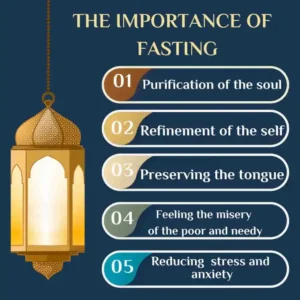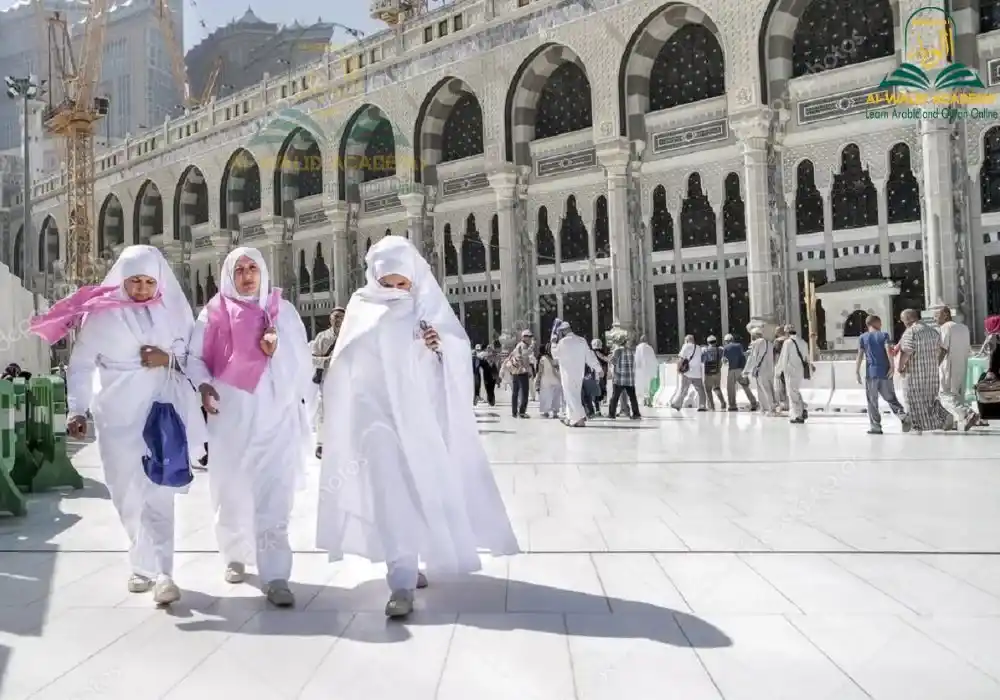Ramadan is a month of goodness and blessings that holds a particular place in Muslim hearts. During this month, Muslims engage in acts of worship in search of forgiveness and liberation from the Fire. To prepare for this blessed month, we must start with a true intention from the heart and recite the dua to start fasting.This article will discuss in detail everything related to the beginning of fasting, Is there a specific dua for starting the fast? And how do we welcome the first night of Ramadan? Keep reading for more.
What is the Niyyat for fasting?
Upon seeing the Ramadan crescent moon, we should establish our niyyah to fast, following the Prophet’s guidance to commence our fast upon its sighting. We ought to emulate the Prophet’s dua that the crescent moon brings us goodness, blessings, and faith.
As the niyyah is rooted in the heart, a Muslim ought to intend to fast for tomorrow before dawn during Ramadan. Scholars agree that the intention made on the first night suffices for the entire month and does not have to be repeated unless there’s a reason to break the fast. If it is, it must be important to renew the intention.
The Prophet has clarified that actions are evaluated based on intentions and that each person will receive an outcome aligned with their intentions. Thus, the ideal dua to start fasting is:
- “O Allah, I intend to fast during Ramadan out of faith and in seeking Your reward. O Allah, please accept it from me, pardon my sins, and make my fast pleasing to You.”
How to make an intention?
Fastings’ intention aims to be sincere and closer to Allah, with acceptance based on specific conditions in the four schools of Islamic law, including:
- The Muslim should aim to fast in his heart, but not express it with his tongue. Imam Ibn Taymiyyah stated that if someone thinks about fasting tomorrow, he has meant to fast.
- The Prophet states that no one can fast without intending to fast from night, as fasting should be initiated from sunset until dawn on the first day of Ramadan
- The niyyah should be unique to the Ramadan fast and not for vows, expiation, or voluntary fasting.
- The intention to fast shouldn’t be conditional on doing anything.
Additionally, waking up for Suhoor and intending to refrain from eating and drinking until the next day’s sunset is part of the fasting intention.
Discover a unique approach to learning Arabic Foundation Course at al-Walid Academy. Our dynamic lessons and interactive activities enhance the learning experience. Enroll in our course today for additional information.
What if I forgot to say niyyah for fasting?
Scholars believe that having the intention to fast during Ramadan is essential, and it is a vital condition for fasting to be sincere, according to the Prophet’s hadith indicating that this intention must be established during the night before the first day of Ramadan. This niyyah can be established once for the whole month or can be repeated each night during Ramadan. As fasting is a form of worship, it is crucial to have a sincere intention towards Allah, as sincerity in our acts of worship has been ordered.
As a result, if fasting is mandatory, having the intention is essential for the fast to be deemed valid, as agreed upon by scholars. Thus, an individual must compensate for that day as a means of atonement.
- Looking to enhance your language skills? Our Arabic language course at Waleed Academy covers all aspects of the language, allowing you to acquire the language in an interactive and engaging way. Don’t miss this opportunity and join us!
What do you do on the first night of Ramadan?
As the sacred month of Ramadan approaches, the month in which the Quran was revealed and fasting was made mandatory by Allah, we greet this time with happiness, praying that the sighting of its crescent moon brings us prosperity and blessings. It is stated that on the first night of Ramadan, according to the hadith of the Prophet the gates of Hell are shut, the doors of Paradise are open, and the devils are chained.
قال النبي(ص):” إذا جاء رمضان فُتحـت أبواب الجنة، وغُـلقـت أبواب النار وصُفّـدت الشياطين.”
As the first-night approaches, we ought to get ready in the following way:
- A dua to start fasting, where there are no exact phrases from the Prophet, we ask Allah to accept our fasting, our standing in prayer, and our recitation of the Quran.
- Getting ready for the Taraweeh prayer together at the mosque, as the Prophet mentioned, whoever performs prayers during Ramadan with faith and in hopes of reward, Allah will pardon their sins.
قال النبي(ص):”من صام رمضان إيمانًا واحتسابًا غفر له ما تقدم من ذنبه.”
- Establishing the niyyah to fast in one’s heart should be done with sincerity, without the necessity of speaking it out loud.
- Recollecting Allah and reciting the Quran.
- Rising for Suhoor as instructed by the Prophet brings a blessing.
- Getting ready for the Fajr prayer in a group.
- After the Fajr prayer, sitting to remember Allah and reciting the Quran until sunrise, as the Prophet taught us, brings a reward equivalent to performing both Umrah and a full Hajj.
قال الرسول(ص):” من صلى الفجر في جماعة ثم قعد يذكر الله حتى تطلع الشمس، ثم صلى ركعتين، كانت له كأجر حجة وعمرة تامة.”
- Praying the Dhuha prayer.
- Getting ready to fast on the first day of Ramadan.
Read about: Surah Baqarah Last Two Ayat
The Blessings of Suhoor
 Suhoor was mandated during Ramadan due to its significant advantages, as the Prophet encouraged us to partake in it because of its many benefits, including:
Suhoor was mandated during Ramadan due to its significant advantages, as the Prophet encouraged us to partake in it because of its many benefits, including:
- The ability to do acts of worship during the day in Ramadan, including fasting, prayer, Quran recitation, and dhikr.
- Enduring the difficulty of fasting when a hungry person is unable to do everyday duties.
- Obeying the Prophet’s teachings and Sunnah.
- Unlike the People of the Book, the suhoor distinguishes our fasting from theirs, according to the Prophet.
- Waking up late for prayer, dua, and dhikr.
- Performing Fajr prayer in a group.
It is recommended to begin the suhoor with a dua to start fasting. That should be honest and from the heart, as in: “O Allah, I intend to fast tomorrow, the day of Ramadan.” Furthermore, the Prophet Muhammad (PBUH) advised us to eat suhoor, even if it was only a sip of water.
قال النبي(ص):”السحور أكله بركة فلا تدعوه، ولو أن يجرع أحدكم جرعة من ماء؛ فإن الله عز وجل وملائكته يصلون على المتسحرين.”
There are no restrictions on the sort of food eaten during suhoor. Muslims can eat everything, even dates.
قال الرسول(ص):” نعم سحور المؤمن التمر.”
It is recommended that the suhoor meal be delayed until shortly before dawn to avoid the hardships of fasting. According to Zayd ibn Thabit, they used to have suhoor with the Prophet before standing up for the Fajr prayer, and the time between suhoor and the adhan was equivalent to the time it took to recite fifty verses. This confirms God’s command, “And eat and drink until the white thread of dawn becomes distinct to you from the black thread.”
قال تعالي” وَكُلُوا وَاشْرَبُوا حَتَّىٰ يَتَبَيَّنَ لَكُمُ الْخَيْطُ الْأَبْيَضُ مِنَ الْخَيْطِ الْأَسْوَدِ مِنَ الْفَجْرِ ثُمَّ أَتِمُّوا الصِّيَامَ إِلَى اللَّيْلِ.”
Read more: Benefits of Reading Quran at Night
Dua to start fasting
As we illustrated before there is no particular dua to start fasting and the most crucial thing is to have a sincere niyyah to fast for the sake of Allah. You can state your intention silently in your heart.
Here’s a simple dua to express your intention:
- “O Allah, I intend to fast tomorrow for Your sake”.
Although the Prophet did not give a specific dua for starting the fast, there are recommended duas to recite after breaking it. Among them are:
- The thirst is gone, the veins have been quenched, and the reward and blessings of Allah have been established.
قال الرسول(ص):”ذهب الظمأ و ابتلت العروق و ثبت الأجر إن شاء الله”
- The general dua is to ask Allah for forgiveness and mercy.
“اللهم إني أسألك برحمتك التي وسعت كل شيء أن تغفر لي”
The Prophet Muhammad (PBUH) stated that a fasting person’s dua is answered when the fast is broken, and that three types of duas are never rejected: “the fasting person until he breaks his fast, the just ruler, and the oppressed.”
-
Ready to delve into the depths of the Quran? Al-Walid Academy’s Learn Arabic and Quran Online And Arabic and Quran Courses make it easy to master Arabic grammar and recite the Quran with perfect tajweed.
Read about: 5 Surahs to Recite Daily
Is it Haram to miss a day of fasting?
Breaking the fast during Ramadan without a valid reason is considered a severe sin because it destroys the sanctity of the month and disobeys God’s commands. Whoever does this must repent to God and perform expiation by liberating a slave, fasting for two months straight, or feeding sixty needy people.
وقيل إن رجلًا أفطر في رمضان، “فأمر رسول الله (ص) أن يكفر بعتق رقبة، أو صيام شهرين متتابعين، أو إطعام ستين مسكيناً”.
Those who break their fast for a legitimate reason, such as:
- Illness.
- Long-distance travel.
- Pregnancy.
- Breastfeeding.
- Menstruation.
- Postpartum bleeding.
قال النبي(ص):” الله وضع عن المسافر نصف الصلاة والصوم، وعن الحبلى والمرضع الصوم”.
All of them are just required to make up the missing days, with no expiration. And those with severe illness or the elderly who find fasting difficult, pay expiation by feeding a needy person for every day they have broken their fast
- Learn Arabic anytime, anywhere! Our Online Arabic Conversation Classes allow you to set up a personalized schedule. Enjoy learning Arabic from the comfort of your own home.
Maybe like: Is it Haram to Listen to Quran While Sleeping
At what age is fasting mandatory in Islam?
It is advised that children begin fasting at an early age to maintain good physical and psychological health. Some scholars state that the age of 10 is appropriate for beginning such devotion, citing the Prophet’s sunnah, and recommending training children to pray at this age.
The purpose of this training is to teach patience and tolerance in children and prepare them to accept fasting as a form of worship once they reach puberty. Parents can achieve this by teaching their children the appropriate way to fast, beginning with the intention and dua to start fasting and ending with the breaking of the fast, as well as encouraging them to take part in other acts of worship such as reciting the Quran and remembering Allah. Once he reaches the age of 15, he is obligated to fast.
-
Are you looking for the best way to teach your child the Quran? Al-Walid Academy provides Quran lessons for Kids online, which are designed specifically for children. Establish in your child, a love of the Quran and invest in their religious and academic future today!
Read: Prayer After Full Reading The Entire Quran
What to say before fasting not in Ramadan
While fasting during Ramadan is obligatory for all Muslims, there are other days of the year when voluntary fasting is encouraged as a way of growing closer to God and seeking forgiveness. The reward for such fasting is said to be significant, as it can separate a person from Hellfire for seventy years.
قال(ص):” من صام يومًا في سبيل الله بعد الله وجهه عن النار سبعين خريفًا”.
You don’t need to make a decision the night before to fast voluntarily after Ramadan. You can simply decide to fast during the day by saying a dua to start fasting”, ‘O Allah, I intend to fast today.’ This is reinforced by a hadith in which the Prophet entered Aisha’s room and, upon seeing no food, said ‘I am fasting,’ indicating that it is acceptable to fast throughout the day.”
There are some days when fasting is suggested, and you can make dua for whatever you wish as:
- Six days of Shawwal might provide a significant reward after Ramadan as if you had fasted all year.
- Fasting on the 13th, 14th, and 15th of each Arabic month is known as the “white days”.
- Fasting on Mondays and Thursdays of each week is encouraged because good deeds are given to God on these days, and the Prophet loved to have his deeds raised while fasting.
- The Day of Ashura has the virtue of sacrificing the preceding year’s sins.
- Fasting on Arafah has a tremendous virtue in exploiting the sins of the previous and upcoming years.
قال النبي(ص):” صيام يوم عرفة، أحتسب على الله أن يكفر السنة التي قبله، والسنة التي بعده، وصيام يوم عاشوراء، أحتسب على الله أن يكفر السنة التي قبله”.
Read about: Dua for Intention of Umrah
Which days are forbidden for fasting in Islam?
 Scholars have broadly agreed to the prohibition of fasting on the following days:
Scholars have broadly agreed to the prohibition of fasting on the following days:
- Eid al-Fitr occurs on the first day of the month of Shawwal.
- The day of sacrifice, also known as Eid al-Adha, begins on the tenth day of the month of Dhul Hijjah.
عن أَبِي هريرة رضي الله عنه: “أن رسول الله (ص) نهى عن صيام يومين: يوم عيد الأضحى، ويوم عيد الفطر”.
- Tashriq’s Days The eleventh, twelfth, and thirteenth days of Dhul Hijjah are for eating, drinking, and remembrance of Allah.
قال النبي:”أيام التشريق أيام أكل وشرب وذكر الله”.
- Day of Doubt This is the final day of the month of Sha’ban.
- Fasting on Friday alone was forbidden by the Prophet unless one fasted the day before or after.
Read more: Forbidden Times of Salah
The importance of fasting
 As soon as we begin the dua to start fasting, we open a wide door to abundant blessings. Fasting is a spiritual experience that provides the following benefits:
As soon as we begin the dua to start fasting, we open a wide door to abundant blessings. Fasting is a spiritual experience that provides the following benefits:
- Purification of the soul by establishing closer to God by acts of obedience to win in this world and the Hereafter by forgiveness of sins and release from hellfire.
- The refinement of the self by staying away from everything that God has forbidden, for every action a person does is for himself except fasting, which is for God.
- Preserving the tongue and not saying obscene and forbidden words, because the Muslim knows that the breath of the observer is sweeter to Allah than the fragrance of musk.
قال(ص):”إن الله عز وجل يقول كل عمل ابن آدم له إلا الصيام؛ فإنه لي وأنا أجزي به، والصيام جنّة، وإذا كان يوم صوم أحدكم فلا يرفث، ولا يصخب، فإن سابّه أحد أو قاتله فليقل: إني امرؤ صائم، والذي نفس محمد بيده لخلوف فم الصائم أطيب عند الله من ريح المسك، للصائم فرحتان يفرحهما: إذا أفطر فرح، وإذا لقي ربه فرح بصومه”.
- Teaching Muslims to be patient and suffer the hardships of hunger and thirst.
- Feeling the misery of the poor and needy, and hastening to volunteer to do good for them.
- An opportunity to reduce stress and anxiety and achieve clarity of mind.
- Fasting has physical benefits such as improving heart health, regulating blood sugar levels, aiding digestion, and eliminating toxins. This confirms God’s words: “And that you fast is better for you, if only you know”.
قال تعالى:”وَأَن تَصُومُوا خَيْرٌ لَّكُمْ إِن كُنتُمْ تَعْلَمُون”. [سورة البقرة آية:١٨٤]
Al Waleed Academy’s Islamic Studies course can help you understand Islam more deeply. Learn from seasoned scholars by studying Islamic principles through modern views. Call us now!
Read about: Laylatul Qadr Surah in English
Summary
To begin fasting, Muslims must establish their Niyyat, which is rooted in the heart and should be recited on the first night of the fast. The ideal dua to start fasting.is “O Allah, I intend to fast during Ramadan out of faith and in seeking Your reward. The Prophet’s hadith states that this intention must be established during the night before the first day of Ramadan. To prepare for fasting, individuals should rise for Suhoor, a meal for Muslims, which is not restricted to any food, including dates. It is recommended to delay it until before dawn. Breaking the fast during Ramadan without a valid reason is considered a severe sin and disobeying God’s commands. Fasting is mandatory in Islam from an early age, with some scholars recommending starting at 10 to maintain good physical and psychological health of children. Fasting teaches Muslims to be patient, suffer hardships, and help the poor and needy.
FAQ
What is the dua for opening fast?
The thirst is gone, the veins have been quenched, and the reward and blessings of Allah have been established.
قال الرسول(ص):”ذهب الظمأ و ابتلت العروق و ثبت الأجر إن شاء الله”.
Is it mandatory to fast in Ramadan?
Fasting is mandatory and obligatory in Ramadan for every sane Muslim and children are excepted from it until they reach puberty.
Can I skip a day of fasting in Ramadan?
It is a sin to break the fast during Ramadan without an excuse, and one must repent of the sin and do penance by feeding sixty poor people, fasting for two consecutive months, or liberating a person.





